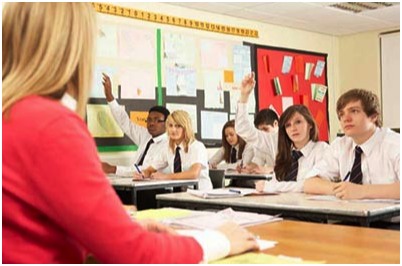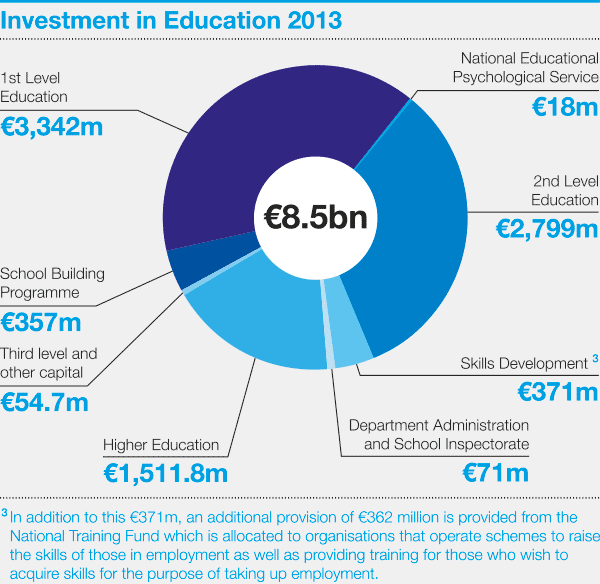Public Service Reform Plan 2014-2016
3.3 Education and Training Sector

International benchmarks show that, while Ireland performs well in some areas, it can do better. There is also a significant challenge, at a time of reducing financial resources, in meeting the needs of an increasing population. Enrolments in schools and at third level have risen substantially in recent years and, according to demographic projections, will continue to rise between now and 2024.
An extensive programme of reform, including the most comprehensive programme of legislative reform in over a decade, is underway across the sector, concentrated on four key themes:
[i] Learning for life: to provide all learners with the knowledge and skills they need to participate fully in society and the economy by means of a system of education and training that enables learners to learn how to learn;
[ii] Improving quality and accountability: to deliver high quality education and training experiences for everyone and improve accountability for educational outcomes across the system including reporting to parents and the school community;
[iii] Supporting inclusion and diversity: to welcome and meaningfully include learners with disabilities and special educational needs and those with language, cultural and social differences and support disadvantaged learners; and
[iv] Building the right systems and infrastructure: to make the best use of available resources to create a modern, flexible education and training system. This means ensuring there are sufficient school places as the school-going population increases, implementing structural and legislative reform to support effective service delivery and making the best use of technology to deliver efficient and effective services.
The key priorities for improved service delivery and sectoral reform in the short to medium term are:
[i] Literacy and numeracy: increasing the time spent on reading, writing and mathematics in primary schools, changing the school curriculum and changing how teachers are trained to achieve the 2020 improvement targets contained in the National Literacy and Numeracy Strategy;
The new mathematics curriculum – Project Maths – is being rolled out to all second level schools

[iii] Choice and equity: giving parents a greater say in the type of primary schools available in their communities and involving them in decision-making on the patronage of new primary and second level schools. A draft regulatory framework to ensure greater fairness, equity and transparency in school enrolment practices has been published and is currently the subject of consultation;
[iv] Improving the transition from school to higher education: working with key stakeholders to address problem areas that impact on students as they move from school to higher education, including reducing the pressure of the points system, too much specialisation in the first year of higher education and grading and problematic predictability of the Leaving Certificate;
A primary learner database is being developed to collect data on each child as they progress through primary school.
[v] Implementing the Higher Education Strategy to 2030: a major reform programme is being advanced in line with the Higher Education Strategy, to improve the quality of the experience of students, to improve the quality of the outcomes from the system and to enhance accountability and the efficient use of resources. This includes a reorganisation of the higher education sector which will see consolidation of institutes of technology, with merged institutes being given the opportunity to apply for designation as technological universities, the providers of teacher education reduced from 19 to 6 and the development of regional clusters of universities and institutes. Furthermore, a new performance framework for higher education is now in place and the Higher Education Authority (HEA) will report to the Minister on the performance of the system in meeting these targets on an annual basis. The HEA will enter into agreements with each of the institutions to set out their contribution to national objectives and the metrics by which their performance will be assessed;
A review of apprenticeships will identify reforms to ensure that newly qualified apprentices are well placed to secure paid employment after their training ends, with the system becoming more closely aligned with labour market needs.
[vi] Integration of the further education and training sectors: SOLAS, the new further education and training agency, has been established and the transfer of responsibility for training to the 16 new Education and Training Boards, created from what were formerly 33 Vocational Education Committees, has begun and will be completed in 2014; and
[vii] Targeted education and training initiatives: As part of the Government’s Action Plan for Jobs and Pathways to Work, the Department of Education and Skills will continue to develop high quality education and training to support unemployed people to return to employment by accessing reskilling and upskilling opportunities appropriate to their needs. The new “Skills Plus” brand is a coordinated approach to presenting the range of enterprise-focused targeted education and programmes available to jobseekers. As one of its first tasks, SOLAS is developing a Further Education and Training (FET) Strategy, which will take account of the FET review recently completed by the National Economic and Social Council.
[vii] Targeted education and training initiatives: As part of the Government’s Action Plan for Jobs and Pathways to Work, the Department of Education and Skills will continue to develop high quality education and training to support unemployed people to return to employment by accessing reskilling and upskilling opportunities appropriate to their needs. The new “Skills Plus” brand is a coordinated approach to presenting the range of enterprise-focused targeted education and programmes available to jobseekers. As one of its first tasks, SOLAS is developing a Further Education and Training (FET) Strategy, which will take account of the FET review recently completed by the National Economic and Social Council.
All second level schools will have high speed broadband installed by the end of 2014.
Implementation of these reforms will deliver a range of benefits for Ireland and for all those who engage in education and training. A well-educated, skilled and motivated population will contribute to economic progress and to the creation of a more equitable society and will enhance Ireland’s reputation among the family of nations. Individual learners will be enabled and empowered to reach their full potential and improve their life chances for the benefit of themselves, their families and society at large.
